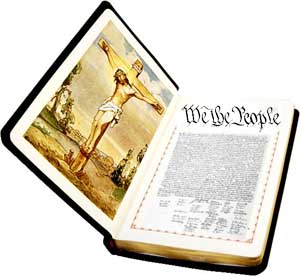-
- Repeal of “Don’t Ask, Don’t Tell” launched in House
- Three more years of debate will set the course for Anglicans and Episcopalians
- Panel rejects Arkansas bill to ban adoptions by cohabiting adults
- Topeka voters decide to keep law barring discrimination
- Baldacci links gay rights to economy
- Report: Hundreds of skilled military leave because of ‘Don’t Ask Don’t Tell’
- Police deem UNC student’s beating a hate crime
- Man pleads guilty for killing lesbian
- National News Briefs
- World News Briefs
feature
Bad religion
The nexus of church and state
Published Thursday, 10-Mar-2005 in issue 898
While the religious right would have people believe the founding fathers built this country to be a Christian Nation, based on literally interpreted Biblical tenets, a quick history lesson reveals this was never the case.
Instead, a casual review of their writings reveals an unwavering commitment to the separation of church and state.
Having fled the tyranny of state-sponsored religion in Europe, as little as seven percent of the people residing in the original 13 colonies belonged to a church at the time the Declaration of Independence was signed.
“A just government, instituted to secure and perpetuate liberty, does not need the clergy,” wrote James Madison, commonly hailed as the father of the U.S. Constitution. “Religion and government will both exist in greater purity the less they are mixed together.”
Pat Boni, a professor of religion and psychology at San Diego State University, noted this secular intent in the architects of our government.
“Benjamin Franklin certainly was anti-religion,” said Boni, who teaches world religion at the University of San Diego this semester. “Most of these guys did not want religion imposed or religion used [in government].”
Despite this historical fact, the religious right continues to evoke the specter of the founding fathers to blur the line between church and state.
At a time when many GLBT people raised in conservative Christian or Catholic churches are discovering gay-affirming congregations and renewing their faith, and outspoken politicians such as San Francisco Mayor Gavin Newsoms are advocating for same-sex marriage rights, the success of fundamentalists to introduce an anti-gay constitutional amendment has been a flashback to the hateful past.
While many liberal and gay-affirming churches are actively promoting a progressive agenda, it is the thunderous din of the religious right that is heard above the rest.
“[They’re] using one or two passages in the Bible to justify homophobia, to justify a million and one things and not using other things in the Bible that are simply overlooked, like ‘Thou Shall Not Kill,’” said Boni.
Ironically, the countries of the European Union – which have collectively toppled the U.S. as the world’s leading economic superpower, and whose state-sanctioned religion our founding fathers once fled – are growing further and further away from God.
Fundamentalists spent considerable cash and energy fighting same-sex marriage in this past election. Meanwhile, in T.R. Reid’s 2004 tome, The United States of Europe: The New Superpower and the End of American Supremacy, the author notes the demise of the institution of marriage among European nations.
The religious right’s claim that a decrease or “pollution” of traditional, heterosexual marriage could send society into a moral tailspin doesn’t hold water, Reid maintains.
“It is hard to argue that twenty-first century Europe is a less moral or caring society than the church-going United States,” he writes. “Yes, Americans put up huge billboards reading, ‘Love They Neighbor,’ but they murder and rape their neighbors at rates that would shock any European nation…. Norwegians don’t go to church, but they give away ten times as much per capita as Americans do in aid to poor countries.”
European reactions to our government’s religious ties range from anger to amusement, Reid notes, like when they hear President Bush and other elected officials end a speech with the words, “God Bless America.”
“The way of truth is by being human, loving and accepting. If you don’t find it in religion, then it’s bad religion.” — Pat Boni, SDSU professor of religious studies Gordon Agar, an openly gay commissioning editor with London’s The Observer newspaper, said religion doesn’t play a big part in the lives of his friends or coworkers.
“Perhaps they’re quieter about it here,” Agar said. “There have been times when I’ve ‘discovered’ someone is a churchgoer and I never would have known, as they didn’t talk about their faith or divulge their religious beliefs.”
Agar said the average Londoner finds the far right mentality “quite scary and dangerous.”
“The oppressiveness and fanatic mentality rubs the Euros the wrong way – even for the most evangelical,” he said. “They’re also seen as hypocrites. We are horrified by images of them on TV, ranting and raving.”
God vs. capitalist America
After years of control by the Catholic Church, Boni believes that Europeans are simply burning out on religion.
“Europe has been firmly entrenched in the Christian religion – mostly Catholicism – until the Reformation,” she said. “Europeans are tired of it. In the Czech Republic, it’s really a secular nation…. They couldn’t care less about religion – the same thing with the French…. Even in Italy where the Pope resides and they have so many hundreds of Lords, the Lords are mostly ignored. They just don’t take it as seriously as we do.”
Boni said the problem is not religion itself, but the fundamentalist attitude that corrupts people’s faith, a process she refers to as “bad religion.”
“Whether you’re a fundamentalist Jew or a fundamentalist Catholic, Protestant, Muslim, Buddhist or Hindu, the problem’s not with the religion, it’s with the fundamentalist attitude – and that’s all over the place.”
Though fundamentalist Christianity has existed as a movement for the past 150 years in this country, Boni said it has only recently sounded an alarm with the populace.
“Frankly, 30 years ago nobody protested when the moral majority started making its noise because we didn’t think they’d be a problem. Now they’re the Christian right and they’re a scary bunch of creeps.”
Though Pope John Paul II made some progress in social reforms, opening a dialogue with Muslims and Jews in the ’60s, he has gone in the other direction on issues such as same-sex marriage, Boni noted.
“Of course he has Parkinson’s and we don’t know how much he is saying is being pushed by [Cardinal Joseph]Ratzinger.”
While teaching courses at the University of San Diego this semester, she said she felt obliged to point out the hypocrisy of the saintly Mother Teresa.
“We were talking about images of people that we would want to say would represent a good human image, a role model, and one of the students said, ‘Mother Teresa.’ I blurted out, ‘God no, she really was a creepy lady’... She was a woman who went into Tijuana and told the young women whose children are selling chewing gum on the bridge but who are fundamentalist Catholics and don’t use birth control, ‘Keep having children, Christ loves poverty.’
“We can’t think that way anymore,” Boni said. “There are voices of reason among the Catholics and among the Protestants, and people who recognize that we are human beings and God loves all of us…. The way of truth is by being human, loving and accepting. If you don’t find it in religion, then it’s bad religion.”
Boni teaches her students that there is treasure to be found in all five of the major religions.
“I also believe that there’s garbage to be found in all five of the five major religions and you’ve got to know that that garbage is destructive and what it is,” Boni said.
The Reverend Arvid Straube of the gay-affirming First Unitarian-Universalist Church in Hillcrest said that to eschew the practice of bad religion, one must read religious text, such as the Old Testament, with a rational mind.
“The Old Testament also forbids people from wearing linen and wool fibers at the same time,” Straube said. “The Old Testament forbids people from, in any way, including handshakes, touching women who are having their menstrual period. The Old Testament allows people to enslave neighboring nations.
“There’s a lot of things that we’ve given up from the Old Testament. I don’t know why people hang onto that one [condemnation of homosexuality] so hard.”
Stephen Cox, the director of Humanities Writing for the University of California, San Diego, said the New Testament has been meticulously translated from the Greek and that it is not likely it was rewritten based on political motivations.
“The King James version has its share of inaccurate translations, but not an awful lot of them,” Cox said. “Basically it’s an extremely literal translation of the Greek words.”
However, said Cox, people’s interpretation of the New Testament and of the Bible is often askew, such [as] when the scriptures were used to justify Prohibition.
“Not only is there nothing against the consumption of alcoholic beverages in the Bible, but the central ceremony of the Christian church is the communal sharing of bread and wine,” Cox said. “They thought that America was getting too liberal in a social respect … [so] they convinced themselves that the Bible is opposed to alcohol.”
The religious right tends to be selective in the moral crusades it gleans from Biblical texts, Straube said.
“It’s a moral issue that the poor are getting poorer in this country,” he said, “but it’s not something that the Right talks about.
“Somebody did an interesting experiment once,” Straube continued. “They cut out every passage of the Bible that talks about justice for the poor and the Bible wouldn’t stay together. There were too many holes in it.”
Straube further noted the absence of any reference to homosexuality in the teachings of Christ.
“If you look at any large movements around the globe through the Renaissance, there have been extremes, but it’s the moderate [view] in the end that continues to win out.” — Greg Wilkins, educator and Metropolitan Community Church member “There’s nothing in any of the four gospels about homosexuality,” he said. “Paul said some things in Romans and Corinthians I think, but there’s debate among Biblical scholars whether he was meaning homosexuality in general or whether he was talking about pederasty.”
Perhaps one of the reasons Christianity is stronger in the United States than in Europe, said Cox, has been the absence of a state-sanctioned church, which led to heightened scrutiny of religious leaders in Europe.
“European churches were blamed for every political thing that went wrong, because there was such a direct link to the state,” Cox said. “Whenever you have an institution which has some kind of monopoly it’s going to become inferior in its way of doing things…. You don’t have to reach out to people, you don’t have to come up with new ideas.”
Despite the trend in Europe, where colossal old cathedrals eek out organ music to row upon row of empty pews, Cox said Christianity in America will not die out, but repeat its history of revival.
Cox argues that presidential elections have always been centered on issues important to interest groups, though their ideology plays only a small role in the aftermath.
“You don’t see any constitutional amendments [becoming law] and you never will,” Cox said. “Bush is a standard American politician. You would think when you listen to the voices on the left and the right that something had changed – that conditions had worsened for gay people. Well, no. Gay marriage is something that just came along. It’s not an old issue and the default position is always, ‘No, I’m not going to vote for that.’”
Writing in the periodical, Liberty, Cox states, “American elections are not won by ‘ideas’ that can conveniently be transformed into mandates. For one thing, the diversity of the American populace, a diversity that is ordinarily very well reflected in any snapshot of either the winning or the losing party, means that no one is able to calculate exactly what this was that appealed to this heterogeneous group of voters and thereby produced the alleged mandate….
“Moral values is a grab bag; it may appeal to people who oppose abortion, gay marriage and stem-cell research but it’s so broadly defined, it pulls in others as well. Fifteen percent of non-churchgoers picked it….
“There was no ‘right-wing Christian revolution’ at the polls, much less an anti-gay revolution,” Cox wrote. “You see a vast revolution in the acceptance of gay people in most Christian denominations.”
Liberal and GLBT-affirming churches have been just as involved in social action and political campaigns as the religious right, Cox said, noting a national ad campaign produced by the United Church of Christ.
The campaign, called “God is Still Speaking”, features a gay couple being turned away at the church doors by a pair of bouncers. At the end of the commercial a message states, “Jesus never turned people away – neither do we…. No matter who you are or where you are on life’s journey, you are welcome here.”
Both CBS and NBC pulled the commercials, calling them “too controversial.”
Despite such efforts by progressive churches, the voice of the religious right is the one that sticks.
“We tend to think that the more religious you get the further to the right you get,” Cox said. “This is not true, but this is sort of in people’s minds. I don’t think that the effort on the Christian left has been very strongly to raise money for the Christian left, [but] when you’ve got a political campaign against gay marriage, you’ve got to raise money for that.”
Action-reaction
Naturally, for every action of the religious right there is an opposite, if not monetarily equal, reaction by GLBT and progressive social activists.
Donna Eubanks, pastor of the New Creation United Church of Christ in Hillcrest, noted how the religious right’s protestations have drawn attention to the issue of civil marriage.
“I think it’s raised the ire of people with hearts, whatever their religion is, to say, you know what, this is not about religion, and it shouldn’t be,” Eubanks said. “It should be about a civil process, which everybody else is entitled to.”
Greg Wilkins, a 38-year-old educator and member of the predominately gay Metropolitan Community Church (MCC) of San Diego, comes from a family of seven, three of which are ministers.
“I think [the religious right] definitely had an impact on how people voted and getting their community involved and motivated to counter what they assumed to be the liberal left,” Wilkins said.
“But it is a minority voice, just like the gay and lesbian voice is a minority voice. It’s about empowering both voices. Hopefully, the moderate American public will find truth between the two.
“Whenever there is a strong [opposing] view,” Wilkins continued, “the idea is not to run away from it but to continue to be engaged with it, so in time ideas and thoughts will kind of evolve. If you look at any large movements around the globe through the Renaissance, there have been extremes, but it’s the moderate [view] in the end that continues to win out.”
A matter of semantics
Perhaps the most effective weapon in the religious right’s toolbox has been co-opting the word ‘family’ – a word used decades earlier by the gay community, though not actively to affect social change.
“The whole business of ‘family values’ on either side of the spectrum being the emphasis of Christianity is very new,” Cox said. “The vocabulary is new, the approach is new. The emphasis is something that I can’t think of having a strong precedence any time before the last 30 years. Go through the New Testament. Look for ‘family values.’ You’re not going to find it.”
Straube agreed that progressive religion is lacking in equally cogent terminology.
“The problem is that the progressive forces in this country have ceded the religious territory to the fundamentalists – period,” Straube said. “We haven’t been paying enough attention. And frankly most religious people disagree with them on many religious issues.
“The moral majority and Jerry Falwell started to have a very organized effort to get their message out, whereas all the mainline churches and the churches that tend to be progressive have not banded together to get one particular message out.”
“This administration is sort of giving the general public permission to go do whatever they want [to GLBT people] and that’s OK because these people are sinners. That bothers me.” — Metropolitan Community Church member Nancy Neel
Losing their religion?
Eubanks said she has seen gay and lesbian people’s faith tested by the religious right, but not destroyed.
“I don’t think there’s been any change in our belief system,” said Eubanks, a former assistant pastor at the Metropolitan Community Church. “I don’t see Bush’s or anybody else’s ugly attitude around the gay community impinging on people’s belief system…. I think they’re frustrated and they’re angry, like most people, around the war mongering and the misusing of information to get more votes.”
However, Eubanks has sensed a revival of the disdain GLBT people felt towards Christ-based religions several decades ago.
“When I talk to people out there, there’s all kinds of spiritualities… but many are still avoiding anything with the word Christian in it,” Eubanks said. “I understand that, because they were badly hurt.”
Longtime MCC member Nancy Neel said she has also seen that despair among the congregation members.
“Over the last 25 years at MCC we’ve had quite a few fundamentalist groups that have picketed outside of our church,” Neel said. “It makes some people want to fight harder. On the other hand, I know there are some people that are really discouraged. We do a lot of prayer.
“I’m 52 years old and I’ve lived in this country 30-something years, and just looking at administrations and the way things go back and forth, this one worries me,” Neel said. “This administration is sort of giving the general public permission to go do whatever they want [to GLBT people] and that’s OK because these people are sinners. That bothers me.”
Straube said the efforts of fundamentalists have worked to turn more people off to religion.
“I can’t tell you how many people have said, ‘I wish I knew you guys existed. I needed a community like yours, but I decided that all religion was repressive so I gave up on it years ago,’” Straube said
Tony Aguirre has been attending the Metropolitan Community Church in San Diego for the past seven years, after a 10-year departure from the Catholic Church and its anti-gay atmosphere.
Aguirre said he feels positive change is on the horizon.
“It feels like we’re making a stepping stone to our own future when it comes to religion,” Aguirre said. “The typical group that has been pushed away, they’re coming back, regardless of what the general society does.”
In the end, Boni said she believes the church is slowly moving towards acceptance of homosexuality.
“You talk to intelligent people and they recognize that you really can’t be religious in a true sense if you’re not inclusive,” she said. “The problem with fundamentalists is that they are exclusive with anyone who doesn’t feel the way they do.”
|
|
Copyright © 2003-2025 Uptown Publications





